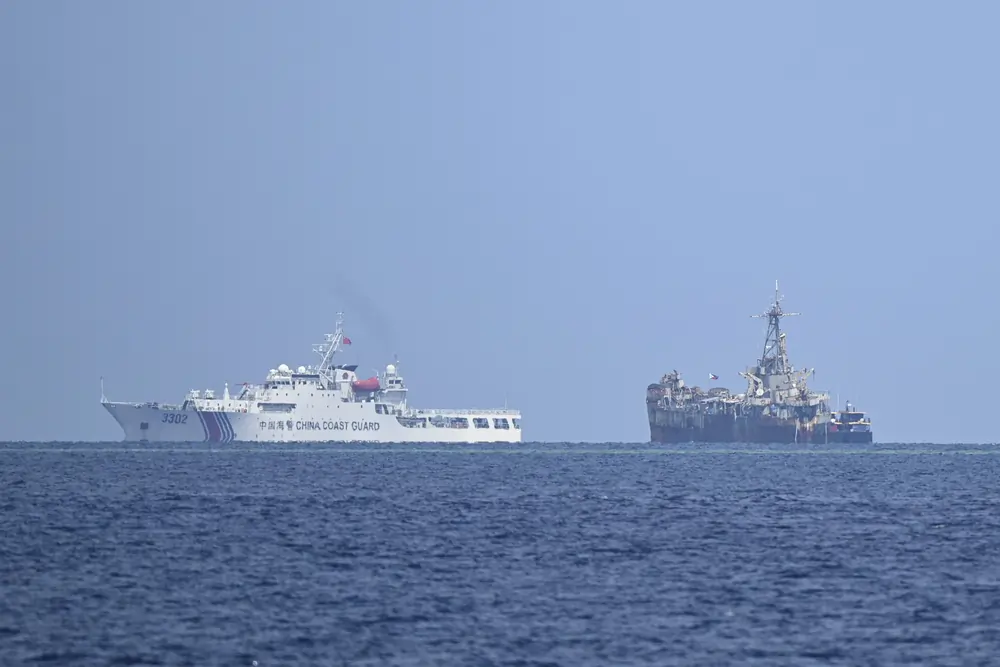Rozul Reef: 2 Chinese Ships Foul In PH Waters Today

Explore Rozul reef and how the Philippines is navigating complex maritime challenges in the South China Sea.
Table of Contents
The Jist
Two Chinese naval vessels were spotted off Palawan near an area where Philippine, US and French warships were holding joint sail – on its last day yesterday – as part of the Balikatan exercises.
The Philippine Coast Guard (PCG), for its part, said it was monitoring the activities of Chinese-flagged research vessel Shen Kuo reportedly sighted traversing Philippine waters.
Western Command (Wescom) spokesman Capt. Ariel Joseph Coloma said Chinese People’s Liberation Army Navy (PLAN) vessels with bow numbers 793 and 167 were spotted four to five nautical miles from the area where the Philippine, US and French ships were engaged in Multilateral Maritime Exercise (MME) some 33 nautical miles northwest of Quezon, Palawan.
Rozul Reef: Chinese Coast Guard Seen in PH Waters
Recently, there have been reports of the Chinese Coast Guard presence near Rozul Reef in Philippine waters, raising concerns and discussions about maritime security and sovereignty in the region.
Background
Rozul Reef, located within the exclusive economic zone (EEZ) of the Philippines, has seen patrols by the Chinese Coast Guard ships, which has drawn attention from Philippine authorities and international observers.
Background on Rozul Reef and Maritime Disputes
Rozul Reef is a geographical feature located in the South China Sea within the Philippines’ exclusive economic zone (EEZ). It is part of the Kalayaan Island Group (KIG) in the Spratly Islands, which are subject to overlapping territorial and maritime claims by multiple countries, including China, the Philippines, Vietnam, Malaysia, and Taiwan.
Maritime Disputes in the South China Sea
The South China Sea is a strategically important waterway and is rich in natural resources, including fisheries and potential hydrocarbon reserves. It is also a vital shipping route for international trade. However, overlapping territorial and maritime claims by coastal states have led to ongoing disputes over sovereignty, maritime boundaries, and resource exploitation.
Historical Context
The disputes in the South China Sea date back several decades and are rooted in historical claims and interpretations of international law. China, in particular, asserts historical rights based on its “nine-dash line” claim, which encompasses most of the South China Sea. The Philippines, Vietnam, and other countries reject this claim and assert their own rights based on UNCLOS, which delineates maritime zones and exclusive economic zones (EEZs) based on coastal geography.
UNCLOS and Legal Framework
The United Nations Convention on the Law of the Sea (UNCLOS), which came into force in 1994, provides a legal framework for defining maritime zones and resolving disputes between coastal states. UNCLOS establishes principles for the delimitation of maritime boundaries, including exclusive economic zones (EEZs) and continental shelf areas. Both the Philippines and China are parties to UNCLOS, although there are differing interpretations and applications of its provisions.
Regional Efforts and Diplomacy
Countries in the region, including ASEAN member states, have engaged in diplomatic efforts to manage disputes and promote maritime cooperation. The ASEAN-China Declaration on the Conduct of Parties in the South China Sea (DOC) was adopted in 2002 as a framework for managing tensions and promoting confidence-building measures. However, progress toward a binding Code of Conduct (COC) in the South China Sea has been slow, reflecting the complex nature of the disputes and divergent interests among stakeholders.
Key Points
Sovereignty Concerns: The presence of foreign vessels, particularly from China, in Philippine waters raises questions about sovereignty and territorial integrity.
Maritime Disputes: This incident highlights ongoing maritime disputes in the South China Sea involving multiple countries, including the Philippines and China.
International Relations: The situation underscores the complexities of international relations and maritime security in the Asia-Pacific region.
Responses
The Philippine government has expressed concern over these developments and is closely monitoring the situation. Diplomatic channels are being utilized to address any potential issues arising from the presence of foreign vessels in Philippine waters.
Responses to Chinese Coast Guard Presence
The presence of the Chinese Coast Guard near Rozul Reef in Philippine waters has prompted responses from various parties, including the Philippine government and international observers.
Philippine Government’s Response
The Philippine government has expressed concern over the presence of Chinese Coast Guard ships near Rozul Reef, which is within the country’s exclusive economic zone (EEZ). Officials have emphasized the importance of upholding Philippine sovereignty and territorial integrity in accordance with international law, particularly the United Nations Convention on the Law of the Sea (UNCLOS). Diplomatic channels are being utilized to address the situation and ensure that Philippine maritime rights are respected.
International Observers
International observers and maritime security analysts are closely monitoring developments in the South China Sea, including the situation near Rozul Reef. The presence of foreign vessels in disputed maritime areas underscores broader geopolitical tensions and the complexities of maritime disputes in the Asia-Pacific region. There is a consensus among many international actors on the importance of maintaining freedom of navigation and adhering to international laws to prevent escalation of tensions.
Regional Diplomacy
The presence of the Chinese Coast Guard near Rozul Reef highlights ongoing maritime disputes and the need for regional diplomacy to promote peaceful resolution of conflicts. Countries in the region, including ASEAN member states, are engaged in dialogue and diplomatic efforts to manage disputes and promote stability. The Association of Southeast Asian Nations (ASEAN) plays a crucial role in facilitating dialogue and cooperation among its member states and external partners to address maritime challenges in the South China Sea.
Diplomatic Engagement:
Engage in Diplomatic Dialogue: Continue diplomatic engagement with relevant parties, including China and other claimant states, to address disputes and promote peaceful resolution through dialogue and negotiations.
Utilize Multilateral Platforms: Utilize multilateral platforms such as ASEAN-led mechanisms to foster cooperation and build consensus on maritime issues in the region.
Adherence to International Law:
Uphold UNCLOS: Emphasize adherence to the principles of international law, particularly the United Nations Convention on the Law of the Sea (UNCLOS), to guide maritime rights and responsibilities.
Seek Legal Clarity: Pursue legal mechanisms and international arbitration to clarify maritime boundaries and resolve disputes based on UNCLOS provisions.
Regional Cooperation:
Strengthen Regional Cooperation: Enhance cooperation among ASEAN member states and engage with external partners to promote maritime security, freedom of navigation, and rule of law in the South China Sea.
Support Confidence-Building Measures: Implement confidence-building measures to reduce tensions and promote trust among parties involved in maritime disputes.
Capacity-Building and Surveillance:
Enhance Maritime Surveillance: Strengthen maritime domain awareness and surveillance capabilities to monitor activities in disputed areas and protect national interests.
Invest in Capacity-Building: Invest in capacity-building initiatives to enhance maritime security and safety, including training for coast guard and naval forces.
International Engagement:
Engage with International Community: Seek support and engagement from the international community, including like-minded countries and organizations, to promote stability and uphold international norms in the South China Sea.
Peaceful Resolution:
Prioritize Peaceful Resolution: Emphasize the importance of resolving disputes peacefully and avoiding escalatory actions that could undermine regional stability.
Promote Confidence and Trust: Build confidence and trust through constructive engagement and efforts to de-escalate tensions in the South China Sea.
Conclusion
The presence of the Chinese Coast Guard near Rozul Reef is part of broader geopolitical dynamics in the region. It underscores the importance of diplomatic engagement and adherence to international maritime laws and norms to maintain peace and stability in the area. Ongoing developments will continue to be monitored closely by relevant authorities.
In summary, Rozul Reef’s location within the Philippines’ EEZ highlights broader maritime disputes in the South China Sea, which involve competing territorial claims, legal interpretations of UNCLOS, and regional efforts to promote stability and cooperation. The presence of the Chinese Coast Guard near Rozul Reef underscores the complexities and challenges inherent in managing maritime disputes in this strategically important region. Ongoing diplomatic efforts and adherence to international law are essential to preventing escalation and promoting peaceful resolution of conflicts.
Managing maritime disputes in the South China Sea requires sustained diplomatic efforts, adherence to international law, regional cooperation, and engagement with the international community. By upholding principles of peaceful resolution and respecting legal frameworks, stakeholders can work towards promoting stability and security in this strategically important maritime domain. Continued dialogue and cooperation are essential for building trust and fostering a conducive environment for regional peace and prosperity.
For further updates and official statements, it is recommended to refer to reliable news sources and official government announcements regarding this matter. Learn about diplomatic initiatives, strategic alliances, and capacity-building efforts shaping regional stability and security. Discover the Philippines’ role in promoting dialogue, cooperation, and adherence to international law in one of the world’s most critical maritime regions.
We also recommend
ADVERTISEMENT

Jom Bourie a professional poker player and an author of books about poker. Boasts an impressive 37-year tenure in the gambling industry, with a passion for gaming that has earned him a reputation as a trusted and knowledgeable figure. His dedication to precision, integrity, and transparency has enabled him to provide players with unparalleled insights and recommendations for exceptional online gaming experiences.
His videos have been viewed more than 22 million times on YouTube and his casino travel articles have appeared in magazines. He has also written numerous articles for gaming magazines circulation gaming magazines.